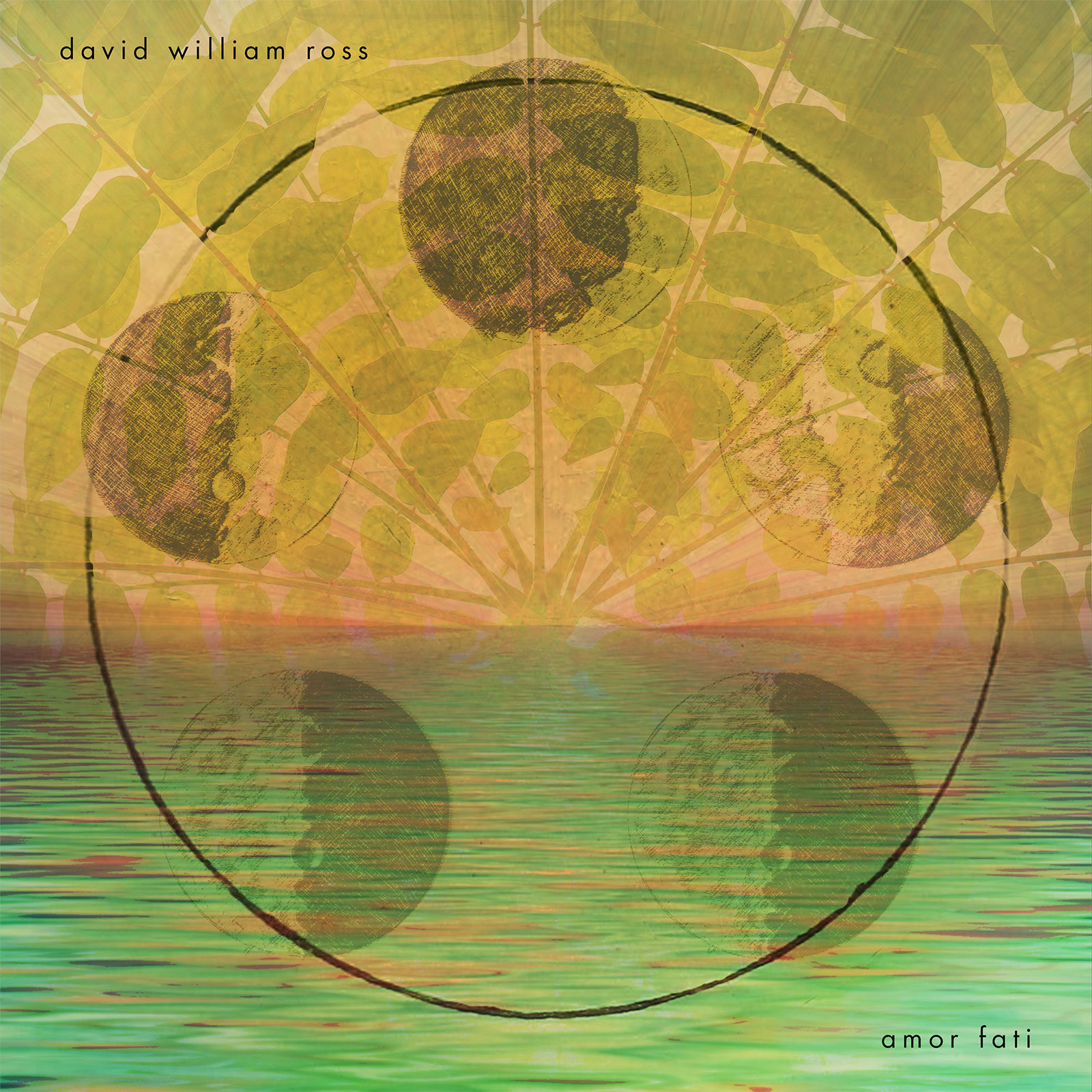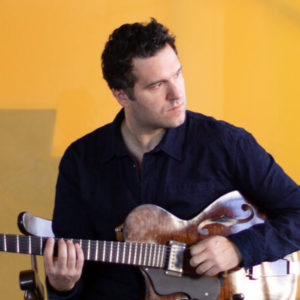
Share Album:
Amor Fati
David William Ross guitar
David William Ross, though considered a classical and jazz guitarist, consistently transcends both genres. He works extensively in collaboration with other accomplished artists, while also being a composer with an impressive library of works that accompany dance and performance art. Ross brings this multifaceted background to the fore in Ravello Records’ AMOR FATI.
Ross opens AMOR FATI with a warm, calming, and familiar folk lullaby: Akira Nakada’s A Song of Early Spring, arranged by Toru Takemitsu. Following is an interpretation of Astor Piazzolla’s Las Estaciones Porteñas (The Four Seasons), a quintet arranged for guitar by Sergio Assad. Beginning with an enigmatic intro, Ross walks listeners through this four-movement story to its peaceful, happy ending. Takemitsu is the composer of the following piece, Equinox, which opens immediately on a dissonant chord, paving the way for a Latin work with a more experimental scaffold.
Next is New Hampshire composer Frank Wallace’s Cyrcles in six movements. The first is entirely ethereal but followed by a fast-moving arpeggiated and percussive territorial second movement and a harp-like third movement. The final movement is a collection of echoes and minor seconds. It is hurried and entirely purposeful. The culminating piece is Leo Brouwer’s Un Dia de Noviembre. In Ross’ own words: “Whenever I play this piece, I find the haunting, repeating melody truly evokes the sense of introspection one finds in November, before the winter sets in and all is asleep and at peace.”
This album feels very familiar, yet is refreshing to hear. Ross’ guitar is one with a rich, buttery timbre surely to ease any listener’s mind. With its expressive, modernist elements, AMOR FATI is an all-around pleasure to listen to.
Listen
Stream/Buy
Choose your platform
Track Listing & Credits
| # | Title | Composer | Performer | |
|---|---|---|---|---|
| 01 | A Song of Early Spring (Arr. T. Takemitsu for Solo Guitar) | Akira Nakada, arr. Toru Takemitsu | David William Ross, guitar | 5:19 |
| 02 | Las Estaciones Porteñas (Arr. S. Assad for Solo Guitar): No. 1, Primavera Porteña | Astor Piazzolla, arr. Sergio Assad | David William Ross, guitar | 5:04 |
| 03 | Las Estaciones Porteñas (Arr. S. Assad for Solo Guitar): No. 2, Verano Porteño | Astor Piazzolla, arr. Sergio Assad | David William Ross, guitar | 3:55 |
| 04 | Las Estaciones Porteñas (Arr. S. Assad for Solo Guitar): No. 3, Otoño Porteño | Astor Piazzolla, arr. Sergio Assad | David William Ross, guitar | 5:17 |
| 05 | Las Estaciones Porteñas (Arr. S. Assad for Solo Guitar): No. 4, Invierna Porteño | Astor Piazzolla, arr. Sergio Assad | David William Ross, guitar | 7:24 |
| 06 | Equinox | Toru Takemitsu | David William Ross, guitar | 7:08 |
| 07 | Sonata No. 3, Op. 94 "Cyrcles": I. Solstice I | Frank Wallace | David William Ross, guitar | 3:33 |
| 08 | Sonata No. 3, Op. 94 "Cyrcles": II. The Light | Frank Wallace | David William Ross, guitar | 3:26 |
| 09 | Sonata No. 3, Op. 94 "Cyrcles": III. Darkness Falling | Frank Wallace | David William Ross, guitar | 5:25 |
| 10 | Sonata No. 3, Op. 94 "Cyrcles": IV. Solstice II | Frank Wallace | David William Ross, guitar | 2:53 |
| 11 | Sonata No. 3, Op. 94 "Cyrcles": V. The Great Sleep - Ko's Way | Frank Wallace | David William Ross, guitar | 6:20 |
| 12 | Sonata No. 3, Op. 94 "Cyrcles": VI. First Truth | Frank Wallace | David William Ross, guitar | 4:01 |
| 13 | Un Día de Noviembre | Leo Brouwer | David William Ross, guitar | 5:06 |
David William Ross guitar
Recorded March 2019 in Keene NH
Engineered, produced, edited & mixed by David William Ross
Executive Producer Bob Lord
Executive A&R Sam Renshaw
A&R Director Brandon MacNeil
A&R Marina Altschiller
VP, Audio Production Jeff LeRoy
Audio Director Lucas Paquette
Mastering Levi Brown
VP, Design & Marketing Brett Picknell
Art Director Ryan Harrison
Design Edward Fleming
Publicity Patrick Niland, Sara Warner
Artist Information

David William Ross
David William Ross is a versatile musician with an embracing approach. He regularly performs classical repertoire but also works in jazz and other improvisatory styles. An advocate of new music, he has worked closely with composers and has recorded and premiered many works by composers from all over the world. Ross frequently collaborates with dancers, choreographers, and multimedia artists in creating original works. A producer and engineer, he has recorded and produced many projects, including his own.
Notes
Nature’s patterns, cycles, circles, birth and death, motion and stillness, the coming and going of light and dark, suffering and happiness. Human existence is awash in the inevitable and in change, from moment to moment engrossed in the passage of time. The individual grasps little of the whole and is a transient witness to only a fragment of something much larger. Amor fati, acceptance, the ability to say yes to life. Not to tolerate, but to love and to embrace all of nature’s patterns, large and small. The Stoic attitude that allows one to look upon Nietzche’s eternal recurrence with reverence and awe, to release the paralyzing horror and to unburden the weight of the unknown, of cycles and circles and light and dark, to affirm life, saying yes, never have I heard anything more divine.
This album offers homage to change and cycles and the patterns that contextualize our lives. Seasons bring rebirth, renewal and life as well as endings, solitude and death. The works heard here contain all of it and much more.
– David William Ross
